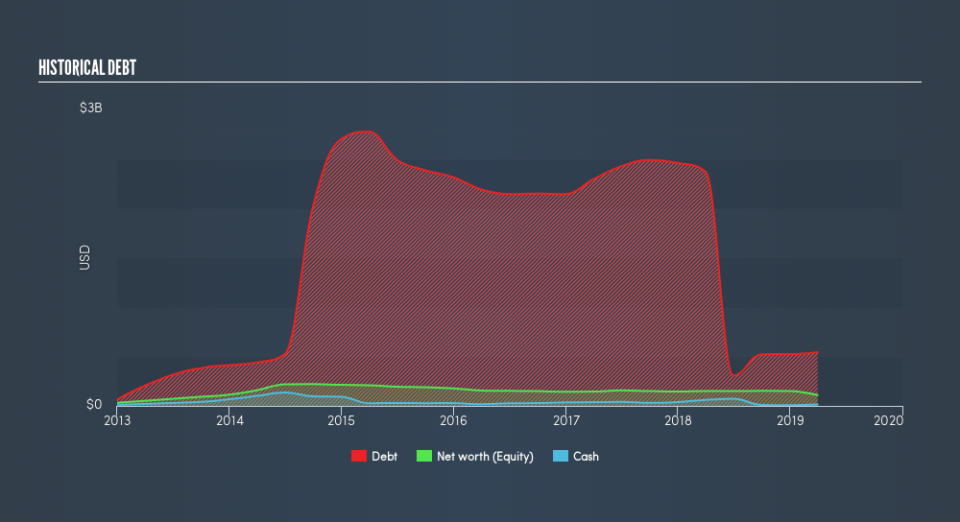Did You Manage To Avoid Hunt Companies Finance Trust's (NYSE:HCFT) Devastating 71% Share Price Drop?

Ideally, your overall portfolio should beat the market average. But every investor is virtually certain to have both over-performing and under-performing stocks. At this point some shareholders may be questioning their investment in Hunt Companies Finance Trust, Inc. (NYSE:HCFT), since the last five years saw the share price fall 71%.
Want to participate in a short research study? Help shape the future of investing tools and you could win a $250 gift card!
See our latest analysis for Hunt Companies Finance Trust
Hunt Companies Finance Trust hasn't yet reported any revenue yet, so it's as much a business idea as an actual business. This state of affairs suggests that venture capitalists won't provide funds on attractive terms. As a result, we think it's unlikely shareholders are paying much attention to current revenue, but rather speculating on growth in the years to come. It seems likely some shareholders believe that Hunt Companies Finance Trust will significantly advance the business plan before too long.
We think companies that have neither significant revenues nor profits are pretty high risk. There is almost always a chance they will need to raise more capital, and their progress - and share price - will dictate how dilutive that is to current holders. While some such companies go on to make revenue, profits, and generate value, others get hyped up by hopeful naifs before eventually going bankrupt. Hunt Companies Finance Trust has already given some investors a taste of the bitter losses that high risk investing can cause.
Our data indicates that Hunt Companies Finance Trust had net debt of US$536,495,924 when it last reported in March 2019. That puts it in the highest risk category, according to our analysis. But since the share price has dived -22% per year, over 5 years, it looks like some investors think it's time to abandon ship, so to speak. The image below shows how Hunt Companies Finance Trust's balance sheet has changed over time; if you want to see the precise values, simply click on the image.
In reality it's hard to have much certainty when valuing a business that has neither revenue or profit. Given that situation, would you be concerned if it turned out insiders were relentlessly selling stock? I would feel more nervous about the company if that were so. You can click here to see if there are insiders selling.
What About Dividends?
As well as measuring the share price return, investors should also consider the total shareholder return (TSR). Whereas the share price return only reflects the change in the share price, the TSR includes the value of dividends (assuming they were reinvested) and the benefit of any discounted capital raising or spin-off. So for companies that pay a generous dividend, the TSR is often a lot higher than the share price return. We note that for Hunt Companies Finance Trust the TSR over the last 5 years was -32%, which is better than the share price return mentioned above. And there's no prize for guessing that the dividend payments largely explain the divergence!
A Different Perspective
It's good to see that Hunt Companies Finance Trust has rewarded shareholders with a total shareholder return of 12% in the last twelve months. Of course, that includes the dividend. That certainly beats the loss of about 7.6% per year over the last half decade. This makes us a little wary, but the business might have turned around its fortunes. It is all well and good that insiders have been buying shares, but we suggest you check here to see what price insiders were buying at.
Hunt Companies Finance Trust is not the only stock insiders are buying. So take a peek at this free list of growing companies with insider buying.
Please note, the market returns quoted in this article reflect the market weighted average returns of stocks that currently trade on US exchanges.
We aim to bring you long-term focused research analysis driven by fundamental data. Note that our analysis may not factor in the latest price-sensitive company announcements or qualitative material.
If you spot an error that warrants correction, please contact the editor at editorial-team@simplywallst.com. This article by Simply Wall St is general in nature. It does not constitute a recommendation to buy or sell any stock, and does not take account of your objectives, or your financial situation. Simply Wall St has no position in the stocks mentioned. Thank you for reading.


